2018
The Missing Martyrs: Why Are There So Few Muslim Terrorists? (updated for the age of ISIS)
Charles Kurzman, The Missing Martyrs: Why Are There So Few Muslim Terrorists? (New York: Oxford University Press, 2019). Released December 7, 2018. More…
From Brain Drain to Brain Flush
 Charles Kurzman, “From Brain Drain to Brain Flush,” October 31, 2018. “Hungary lost hundreds of its brightest minds last week. Some were distinguished professors; some were promising students. Some were Hungarians; many were from other elsewhere, attracted by one of the leading universities in the region. Their school, the Central European University, announced that it is leaving Budapest for Vienna, Austria. This is not a typical case of brain drain. This is a case of ‘brain flush.’” More…
Charles Kurzman, “From Brain Drain to Brain Flush,” October 31, 2018. “Hungary lost hundreds of its brightest minds last week. Some were distinguished professors; some were promising students. Some were Hungarians; many were from other elsewhere, attracted by one of the leading universities in the region. Their school, the Central European University, announced that it is leaving Budapest for Vienna, Austria. This is not a typical case of brain drain. This is a case of ‘brain flush.’” More…
Confidentiality of Human Research Subjects, 1927
 “The faces were concealed in accord with the desire for anonymity expressed to us.”
“The faces were concealed in accord with the desire for anonymity expressed to us.”
– A.-M. Goichot, La vie féminine au Mzab (Paris: Librarie Orientaliste Paul Geuthner, 1927), plat V. More…
The Hidden Heritage of Arab Libraries
 Charles Kurzman and John D. Martin, III, “The Hidden Heritage of Arab Libraries: Online Catalogs and Institutional Barriers to Discoverability,” IFLA Journal (International Federation of Library Associations and Institutions), Vol. 44, No. 4, December 2018, pp. 300-310 (pre-print July 23, 2018). “Advances in technology have made access to information about library holdings a seemingly universal feature of interaction with modern libraries. However, this type of access does not exist evenly throughout the world. There is a vast ‘hidden heritage’ contained in Arab libraries without online public access catalogs. This article reports and summarizes findings from research conducted as part of a year-long investigation into international library collaboration in Arab libraries.” More…
Charles Kurzman and John D. Martin, III, “The Hidden Heritage of Arab Libraries: Online Catalogs and Institutional Barriers to Discoverability,” IFLA Journal (International Federation of Library Associations and Institutions), Vol. 44, No. 4, December 2018, pp. 300-310 (pre-print July 23, 2018). “Advances in technology have made access to information about library holdings a seemingly universal feature of interaction with modern libraries. However, this type of access does not exist evenly throughout the world. There is a vast ‘hidden heritage’ contained in Arab libraries without online public access catalogs. This article reports and summarizes findings from research conducted as part of a year-long investigation into international library collaboration in Arab libraries.” More…
Datasets and information from the Middle East Library Partnership Project.
Who Doesn’t Want Democracy?
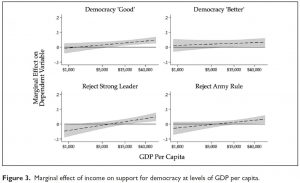 Brandon Gorman, Ijlal Naqvi, and Charles Kurzman, “Who Doesn’t Want Democracy? A Multilevel Analysis of Elite and Mass Attitudes,” Sociological Perspectives, Vol. 62, No. 3, June 2019, pp. 261-281 (pre-print July 11, 2018). “Despite its global rise in popularity, a significant number of people still oppose democracy. … Results of our statistical analyses suggest that … individual income and education have strong effects on individual support for democracy, but this relationship is mediated by country-level economic development.” More…
Brandon Gorman, Ijlal Naqvi, and Charles Kurzman, “Who Doesn’t Want Democracy? A Multilevel Analysis of Elite and Mass Attitudes,” Sociological Perspectives, Vol. 62, No. 3, June 2019, pp. 261-281 (pre-print July 11, 2018). “Despite its global rise in popularity, a significant number of people still oppose democracy. … Results of our statistical analyses suggest that … individual income and education have strong effects on individual support for democracy, but this relationship is mediated by country-level economic development.” More…
The Man Who Broke the World
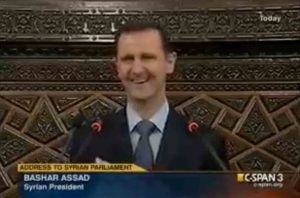 Charles Kurzman, “The Man Who Broke the World,” June 29, 2018. “Bashar al-Asad was training in London to be an eye doctor when his father ordered him into the family business: ruling Syria. Asad’s disastrous performance in this role has triggered a cascade of catastrophes that now threatens to undermine the international institutions that have suppressed global conflict for decades.” More…
Charles Kurzman, “The Man Who Broke the World,” June 29, 2018. “Bashar al-Asad was training in London to be an eye doctor when his father ordered him into the family business: ruling Syria. Asad’s disastrous performance in this role has triggered a cascade of catastrophes that now threatens to undermine the international institutions that have suppressed global conflict for decades.” More…
Hard-Liners Agree: Good Riddance to Iran Nuclear Deal!
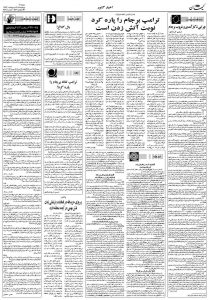 Charles Kurzman, “Hard-Liners Agree: Good Riddance to Iran Nuclear Deal!” June 1, 2018. Hard-liners in Iran agree with the Trump administration: The Iranian nuclear accord was a terrible deal, and never should have been struck! They were relieved when President Trump announced on May 8, 2018, that the U.S. government would reinstate sanctions against Iran, in violation of the 2015 Joint Comprehensive Plan of Action (JCPOA). Trump’s decision vindicated their own longstanding demands that Iran exit the agreement as well. The following day, the hard-line newspaper Kayhan (The Globe) published an article by Ebrahim Karkhaneyi, a member of the Iranian parliament who has opposed the nuclear deal for years. More…
Charles Kurzman, “Hard-Liners Agree: Good Riddance to Iran Nuclear Deal!” June 1, 2018. Hard-liners in Iran agree with the Trump administration: The Iranian nuclear accord was a terrible deal, and never should have been struck! They were relieved when President Trump announced on May 8, 2018, that the U.S. government would reinstate sanctions against Iran, in violation of the 2015 Joint Comprehensive Plan of Action (JCPOA). Trump’s decision vindicated their own longstanding demands that Iran exit the agreement as well. The following day, the hard-line newspaper Kayhan (The Globe) published an article by Ebrahim Karkhaneyi, a member of the Iranian parliament who has opposed the nuclear deal for years. More…
Chasing the Ghosts of Violent Extremism in the Middle East
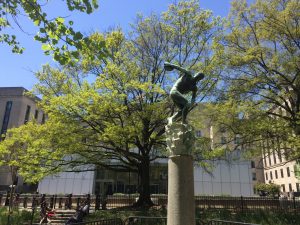 Charles Kurzman, “Chasing the Ghosts of Violent Extremism in the Middle East,” May 1, 2018. Briefing for Samuel Brownback, U.S. ambassador-at-large for international religious freedom. “The primary sources of violent extremism in the Middle East today are … ghosts. They are dead but still with us. They float through borders and walls, disembodied, on the internet and social media. They haunt us with threats of revenge.” More…
Charles Kurzman, “Chasing the Ghosts of Violent Extremism in the Middle East,” May 1, 2018. Briefing for Samuel Brownback, U.S. ambassador-at-large for international religious freedom. “The primary sources of violent extremism in the Middle East today are … ghosts. They are dead but still with us. They float through borders and walls, disembodied, on the internet and social media. They haunt us with threats of revenge.” More…
Nativism, Then and Now
 Charles Kurzman, “Nativism, Then and Now,” March 29, 2018. America’s current bout of nativism is nothing new. The descendants of immigrants have often opposed additional immigration, characterizing recent arrivals as violent, unpatriotic, unwilling to learn proper English, unable to adapt to customs established by earlier immigrants, a burden on other residents and unfair competition for jobs and resources. What has changed over the generations is the target of this hostility. …
Charles Kurzman, “Nativism, Then and Now,” March 29, 2018. America’s current bout of nativism is nothing new. The descendants of immigrants have often opposed additional immigration, characterizing recent arrivals as violent, unpatriotic, unwilling to learn proper English, unable to adapt to customs established by earlier immigrants, a burden on other residents and unfair competition for jobs and resources. What has changed over the generations is the target of this hostility. …
The cartoons pictured below used painfully familiar imagery to depict the Irish as unassimilable, the Chinese as job-stealers, Italians as terrorists, and Jews as communists. Today, President Trump and other nativists aim similar insults at Latin Americans, Muslims, and other immigrants. More…
Unruly Protest
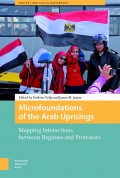 Charles Kurzman, “Unruly Protest,” in Frédéric Volpi and James M. Jasper, editors, Microfoundations of the Arab Uprisings (Amsterdam, Netherlands: Amsterdam University Press, 2018), pp. 183-191. “Near the shore of the Khaleej, outside a conference hall, I lingered after dinner with a group of Arab professionals. They had come from across the region, some for the week and some for good. They read multiple daily newspapers and could lecture confidently on political economy and modern Arab history. Naturally, conversation turned to the so-called Arab Spring. … As debate ran into the night, I began to see a consensus, notwithstanding their theoretical differences: the uprisings of the Arab Spring were both inevitable and doomed. They had to happen, and they had to fail.” More…
Charles Kurzman, “Unruly Protest,” in Frédéric Volpi and James M. Jasper, editors, Microfoundations of the Arab Uprisings (Amsterdam, Netherlands: Amsterdam University Press, 2018), pp. 183-191. “Near the shore of the Khaleej, outside a conference hall, I lingered after dinner with a group of Arab professionals. They had come from across the region, some for the week and some for good. They read multiple daily newspapers and could lecture confidently on political economy and modern Arab history. Naturally, conversation turned to the so-called Arab Spring. … As debate ran into the night, I began to see a consensus, notwithstanding their theoretical differences: the uprisings of the Arab Spring were both inevitable and doomed. They had to happen, and they had to fail.” More…
Counting Terrorists: The Urgent Need for Comprehensive Data
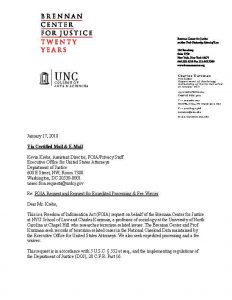 Charles Kurzman, “Counting Terrorists: The Urgent Need for Comprehensive Data,” Lawfare, January 23, 2018. “From the launch of Donald Trump’s presidential campaign—“we have no protection and we have no competence”—to last week’s joint report from the Homeland Security and Justice departments, “Protecting the Nation From Foreign Terrorist Entry Into the United States,” Trump and his supporters have argued that terrorism in the United States is primarily the work of immigrant Muslims. … Before blaming terrorism on immigrants, the public needs more complete data. The Brennan Center and I are working on getting that information. Last week, we filed a Freedom of Information Act request to the Executive Office of the United States Attorneys to start the process of identifying all terrorism prosecutions, including domestic terrorism cases.” More…
Charles Kurzman, “Counting Terrorists: The Urgent Need for Comprehensive Data,” Lawfare, January 23, 2018. “From the launch of Donald Trump’s presidential campaign—“we have no protection and we have no competence”—to last week’s joint report from the Homeland Security and Justice departments, “Protecting the Nation From Foreign Terrorist Entry Into the United States,” Trump and his supporters have argued that terrorism in the United States is primarily the work of immigrant Muslims. … Before blaming terrorism on immigrants, the public needs more complete data. The Brennan Center and I are working on getting that information. Last week, we filed a Freedom of Information Act request to the Executive Office of the United States Attorneys to start the process of identifying all terrorism prosecutions, including domestic terrorism cases.” More…
The FOIA request is available here.
Muslim-American Involvement with Violent Extremism, 2017
 Charles Kurzman, “Muslim-American Involvement with Violent Extremism, 2017,” January 18, 2018. The number of Muslim-Americans associated with violent extremism continued a downward trend that was visible in the final year of the Obama administration. This trend defied expectations that President Donald Trump’s presidency would generate a distinctive pattern of violent extremism. The administration did not identify “support networks” for terrorism in the United States, as Trump had promised, and Trump’s anti-Muslim rhetoric and policies did not trigger a backlash of increased violent extremism, as some Muslim extremists had predicted. More…
Charles Kurzman, “Muslim-American Involvement with Violent Extremism, 2017,” January 18, 2018. The number of Muslim-Americans associated with violent extremism continued a downward trend that was visible in the final year of the Obama administration. This trend defied expectations that President Donald Trump’s presidency would generate a distinctive pattern of violent extremism. The administration did not identify “support networks” for terrorism in the United States, as Trump had promised, and Trump’s anti-Muslim rhetoric and policies did not trigger a backlash of increased violent extremism, as some Muslim extremists had predicted. More…
Examine the data for yourself here.
Previous annual reports on Muslim-American involvement with violent extremism are available here.